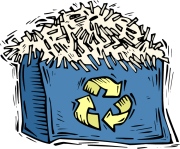 We’ve just started a new year. Now is a great time to sort and shred miscellaneous documents and bills you won’t need any longer.
We’ve just started a new year. Now is a great time to sort and shred miscellaneous documents and bills you won’t need any longer.
The big question is what needs shredded versus what can be safely recycled?
Psst. Notice I said recycle and not pitch in the garbage bin. Learn from that. *wink* Recycling is easier than ever.
WHAT CAN SAFELY BE RECYCLE WITHOUT SHREDDING
There’s a lot of things that you can simply recycle without the need to shred. Some of the most common are:
- Any, and all, junk mail that aren’t credit card solicitations.
- Miscellaneous charity soliticitations.
- Old utility bills.
- Receipts from your credit card with all but the last four digits X’d out.
- The body of a letter.
- All envelopes.
I tear off and shred the top one-third of letters and bills  if it contains my name and address, particularly if it’s a notice from a financial or investment institute. I don’t want people sifting through my papers knowing where I have accounts. If it’s a standard letter, anyone can get that information from the phone book so I feel it’s not as necessary.
if it contains my name and address, particularly if it’s a notice from a financial or investment institute. I don’t want people sifting through my papers knowing where I have accounts. If it’s a standard letter, anyone can get that information from the phone book so I feel it’s not as necessary.
TIP: I don’t have a shred box at my desk, but I do have a To Shred folder and a recycle paper box. When my To Shred folder gets too full, it goes to the shredder, then usually to the recycle bin where it awaits Recycle Day.
a To Shred folder and a recycle paper box. When my To Shred folder gets too full, it goes to the shredder, then usually to the recycle bin where it awaits Recycle Day.
WHAT SHOULD BE SHREDDED:
- Any portion of a financial statement containing your name, social security number, or account information.
- Pre-filled credit card solicitations. You know the ones. You get these a couple of times a week.
FYI: Always write “Void” across any credit card application you’re mailing back to request removal from a mailing list.
- Prescription receipts. Being the paranoid kind of person I am, I shred these. People don’t need to know what drugs my family or I have paid for or been prescribed. I’ve done this for years, and when HIPAA came out I felt vindicated.
- Anything with your full credit card number.
When recycling shredded paper, check with your recycle center on how they’d like you to send it. Mine asks it be in a separate bag.
TIP: If you own a business, organize your own  Recycle Day. Have all department staff—essential staff can also pitch in until they’re required to answer the phone or help a customer—sort files. If you have too many documents for in-house shredding, there are reputable shredding services. Consult your Better Business Bureau and hire one.
Recycle Day. Have all department staff—essential staff can also pitch in until they’re required to answer the phone or help a customer—sort files. If you have too many documents for in-house shredding, there are reputable shredding services. Consult your Better Business Bureau and hire one.
WHEN TO SHRED:
I struggle with when to shred as much as what. The State of Washington’s Attorney General site has super info on why, what, and when to shred at What to Shred.
TIP: I have a printed copy of retention guidelines taped to the front of my To File folder, and another copy in the front of my filing cabinet.
Last Thoughts on Records:
If you’re interested in what to receive digitally in our paper-free computer society, here’s a great article at Kiplinger.com.
If you have questions about record retention for tax purposes, visit irs.gov and search recordkeeping.
I hope you’ve learned something new or gotten new ideas.
Have a great week, and thanks again for following Patti’s Pathways. 😀
DISCLAIMER: Any and all ideas presented in this blog are solely my own unless otherwise noted. I experience troubles with technology just like any other person, and if I stumble upon a fix or suggestion I feel could benefit others I pass it along. At no time, have I suggested or implied that I hold any degrees or certificates related to computer repair.
I have during my career assembled parts into working computers; done troubleshooting on hardware and software; utilized a great many computer programs and software; designed and updated websites and blogs; as well as created brochures, banners, and flyers.


Sometimes, we need to be reminded of the basics when it comes to shredding. Too often, people are subjected to identity theft because they do not dispose of their financial statements properly.
LikeLike
Thanks for the comment, Stan. I couldn’t agree more.
LikeLike